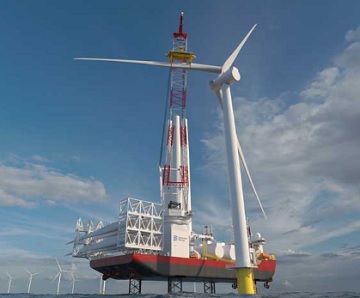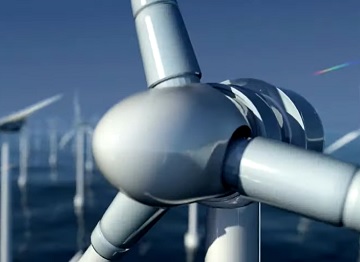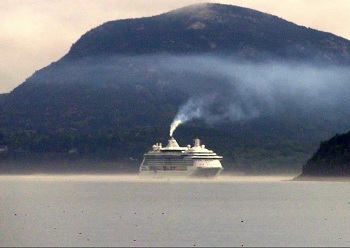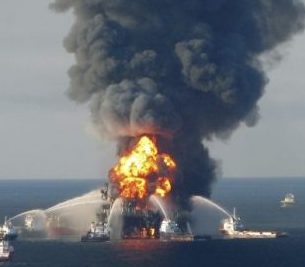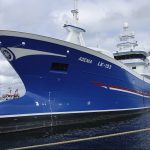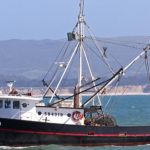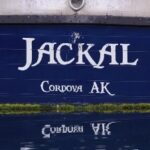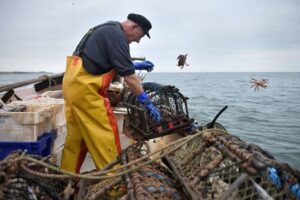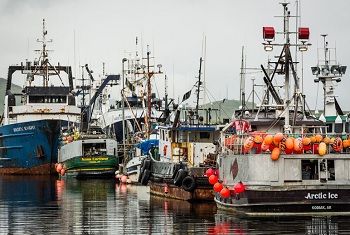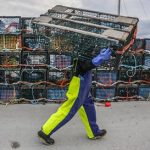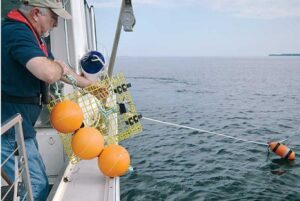Tag Archives: Jones Act
A fishing conglomerate created a fake company to facilitate a merger. It could now be on the hook for billions of dollars.
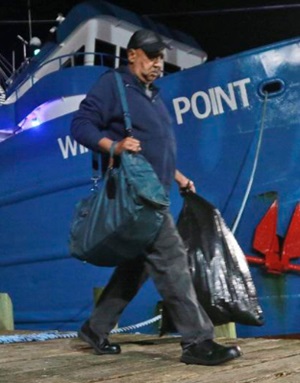 Commercial fishers are one of the professions that’s been nickeled-and-dimed in recent decades, right up there with long-haul truckers and chicken farmers. In New Bedford, Massachusetts, the most lucrative port for seafood catches in the country, a fisherman profiled by ProPublica in 2022 was forced to contract with one of the world’s seafood powerhouses, Blue Harvest, because it had become the only buyer in the local market. Per the contract, fishers have to lease fishing permits from the company; the costs for vessel maintenance, fuel, gear, and repairs on company-owned boats are taken out from fishers’ own paychecks, called settlement sheets. After fishing around the clock for ten days to meet quotas, Jerry Leeman only made 14 cents on the pound and his crew 7 cents, even as their haddock catch sold for $2.28 per pound at market. Blue Harvest took the lion’s share of earnings, while placing all the risks of the trade onto fishers. “Tell me how I can catch 50,000 pounds of fish yet I don’t know what my kids are going to have for dinner,” more, >>CLICK TO READ<< 07:59
Commercial fishers are one of the professions that’s been nickeled-and-dimed in recent decades, right up there with long-haul truckers and chicken farmers. In New Bedford, Massachusetts, the most lucrative port for seafood catches in the country, a fisherman profiled by ProPublica in 2022 was forced to contract with one of the world’s seafood powerhouses, Blue Harvest, because it had become the only buyer in the local market. Per the contract, fishers have to lease fishing permits from the company; the costs for vessel maintenance, fuel, gear, and repairs on company-owned boats are taken out from fishers’ own paychecks, called settlement sheets. After fishing around the clock for ten days to meet quotas, Jerry Leeman only made 14 cents on the pound and his crew 7 cents, even as their haddock catch sold for $2.28 per pound at market. Blue Harvest took the lion’s share of earnings, while placing all the risks of the trade onto fishers. “Tell me how I can catch 50,000 pounds of fish yet I don’t know what my kids are going to have for dinner,” more, >>CLICK TO READ<< 07:59
IS THE G.A.O. SLOWWALKING ITS INVESTIGATION OF OFFSHORE WIND IMPACTS? By Jim Lovgren
 On June 15, 2023, Congressman Chris Smith issued a press release touting the acceptance by the General Accountability Office [GAO], of a request by the House Natural Resources Committee to investigate a wide range of issues related to the development of offshore wind. The Committee letter, signed by Chairman Bruce Westerman, was submitted on May 15 th , 2023, almost a year ago. I bring this up because the average time-length of most GAO investigations is three months. Which begs the question; Is the Biden administration “slow-walking” the GAO investigation? Slow-walking is the act of purposefully delaying action by stalling, stonewalling, making excuses of how hard it is to do, and other whiney efforts at delaying an investigation until it fails because it is too late. It is the bureaucrat’s favorite weapon of choice when forced to disclose vital information, that their politician benefactors don’t want exposed. more, >>click to read<< 06:10
On June 15, 2023, Congressman Chris Smith issued a press release touting the acceptance by the General Accountability Office [GAO], of a request by the House Natural Resources Committee to investigate a wide range of issues related to the development of offshore wind. The Committee letter, signed by Chairman Bruce Westerman, was submitted on May 15 th , 2023, almost a year ago. I bring this up because the average time-length of most GAO investigations is three months. Which begs the question; Is the Biden administration “slow-walking” the GAO investigation? Slow-walking is the act of purposefully delaying action by stalling, stonewalling, making excuses of how hard it is to do, and other whiney efforts at delaying an investigation until it fails because it is too late. It is the bureaucrat’s favorite weapon of choice when forced to disclose vital information, that their politician benefactors don’t want exposed. more, >>click to read<< 06:10
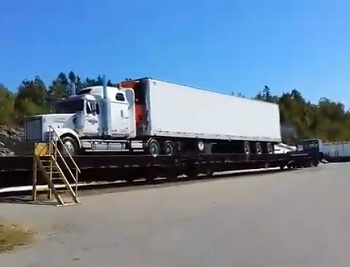
U.S. Shipowners Back Jones Act Penalties for “Canadian Rail” Scheme
ASC and its logistics affiliate Alaska Reefer Management have access to a 100-foot-long “railway” in New Brunswick, Canada, which they use as part of a foreign-flag shipping route between two U.S. markets. Last month, U.S. Customs and Border Protection’s Jones Act enforcement office issued penalties totaling about $350 million dollars to the firms involved in this novel supply network, including tens of millions in fines for foreign-flag shipowners. The action has effectively halted ASC shipments of pollock to East Coast customers, and ASC says that the shutdown threatens to cause significant harm to its business, along with regional shortages of pollock, an affordable staple for schools, institutions and government nutrition programs. ARM and terminal subsidiary Kloosterboer have filed suit against CBP, seeking to block the penalties. Video, >click to read< 07:41
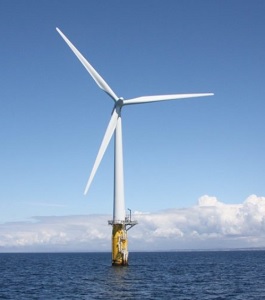
Offshore Wind Will Deliver Few U.S. Jobs; Lack of Oversight Means Most Jobs Will Be Overseas
New developments have raised serious questions regarding the economic and job benefits from offshore wind energy projects in U.S. waters. Unsubstantiated claims of significant economic growth and investment have exaggerated the benefits of offshore wind energy, and diminished the economic and cultural importance of sustainable American wild-caught fisheries. A new study, conducted by Georgetown Economic Services (GES), finds that “[t]he claim that the huge investments in offshore wind would provide significant job and economic benefits in the U.S. has been grossly inflated.” The study also reaches an important conclusion: many of the jobs and benefits would actually go to the foreign-owned companies currently dominating the wind energy landscape, instead of creating local opportunities. >click to read< 15:45
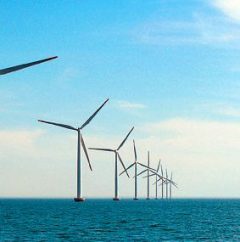
Jones Act changes would ‘jeopardise countless US jobs’ in offshore wind
US fisheries advocacy body the Fisheries Survival Fund (FSF) has claimed proposed changes to the Jones Act – requiring that cargo, including wind turbines, shipped between US ports be transported on American-flagged vessels – could cost ‘countless of job opportunities’ to local companies in the rapidly emerging Northeast Atlantic offshore wind sector. “These proposed modifications would place foreign-owned offshore wind energy companies at a unique advantage not afforded to the thousands of US-owned maritime industries, including commercial fisheries,” said FSF counsel David Frulla. “FSF is not submitting this letter to oppose offshore wind energy development in its entirety,, >click to read< 09:21

Deckhand on a fishing boat alleges he was denied prompt medical treatment
A former deckhand on a fishing/shrimping vessel alleges after he fell and suffered injuries and then suffered a stroke, he did not receive medical attention until six hours later when the ship returned to port. Hung Manh Tran filed a complaint Oct. 23 in Harris County District Court against Platinum Seafood Services Inc., alleging negligence and violation of the Jones Act. >click to read< 11:33
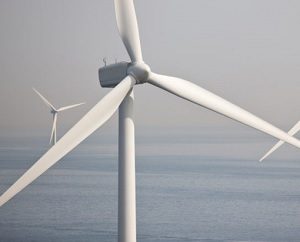
Proposed Customs and Border Protection Modifications Will Weaken the Jones Act
By Meghan Lapp – The Jones Act, or Merchant Marine Act of 1920, has been the foundation of U.S. maritime commerce for 100 years, requiring coastwise trade, i.e. transport of merchandise between two U.S. points, to be conducted on U.S.-flagged, U.S.-owned, U.S.-built vessels, which must be crewed by a minimum of 75% U.S. citizens and/or permanent U.S. residents.,,, On October 23, 2019, Customs and Border Protection issued a bulletin, “Proposed Modification and Revocation of Ruling Letters Relating to CPB’s application of the Jones Act to the Transportation of Certain Merchandise and Equipment Between Coastwise Points” (see page 12). >click to read< 14:35

Louisiana Native Sues Fishing Captain Following Maritime Injury
A Louisiana man is suing a Texas fishing captain following injuries suffered while working on the captain’s vessel. David Robling, the plaintiff, was working aboard the fishing boat, Red Bull, on February 20, 2019, when he suffered injuries resulting from the negligence and unseaworthiness of the ship-captain, Delbert E. Bull, Jr. The suit, filed in the Galveston County District Court, is in accord with the Jones Act, specifically 46 U.S.C. §30104, which protects seamen injured in the course of their employment and which affords them the right to legal action and a trial by jury against the ship’s owner. >click to read<19:45
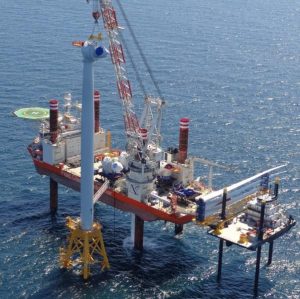
The Jones Act and Offshore Wind in Light of the Aeolus Energy Announcement
A potential sea change came with the recent announcement from Aeolus Energy Partners that the renewable installation and operation company was investing in a fleet of Jones Act-compliant vessels dedicated to the offshore wind industry. Long a barrier to entry for foreign and domestic prospectors alike, the Jones Act, a portion of the Merchant Marine Act of 1920, holds: “A vessel may not provide any part of the transportation of merchandize by water, or by land and water, between points in the United States to which the coastwise laws apply, either directly or via a foreign port [unless the vessel was] built in and documented under the laws of the United States and owned by person who are citizens of the United States.” >click to read<15:03
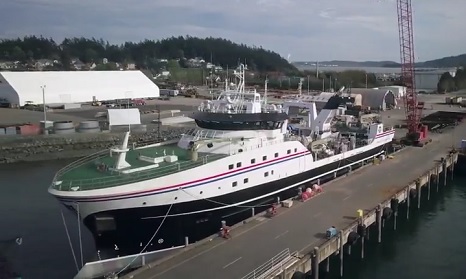
Why this super ship is making enemies in Alaska and on Capitol Hill
A few weeks ago, Helena Park reluctantly repainted her brand new, $75-million, fishing boat to mask its name, “America’s Finest.” It no longer seemed appropriate since the vessel might never fish in American waters. “There’s no ‘finest’ in America anymore. It will be someone else’s ‘finest.’” says Park, who’s the CEO of Fishermen’s Finest, a Washington-based fishing company. The ship’s troubles started when Park’s company made powerful enemies in Alaska and on Capitol Hill. Remote coastal communities that rely on fish processing plants for employment are worried ultra-modern fishing ships like America’s Finest, with its own on-board factory that can process over 500,000 pounds of fish a day, will make them obsolete. Along with rival fishing companies and Alaska’s representatives in the Senate, they’ve devised a strategy to stop America’s Finest from ever leaving the shipyard — using an obscure, century-old law called the Jones Act. Video, >click to read<13:50
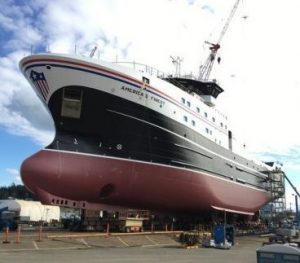
The Jones Act Drives America’s Finest Into Exile
America’s Finest, a brand-new 264-foot fishing trawler, ought to be the pride of the fleet. As a newspaper in its birthplace of Anacortes, Wash., explained, the ship features an “on-board mechanized factory, fuel-efficient hull, and worker safety improvements”—priceless features for fishermen operating in the treacherous seas off Alaska. The ship is also said to have a smaller carbon footprint than any other fishing vessel in its region. According to Fishermen’s Finest, the company that ordered the ship, it would be the first new trawler purpose-built for the Pacific Northwest since 1989. Sadly, it seems increasingly doubtful that the ship will ever ply its trade in U.S. waters. >click to read<09:07
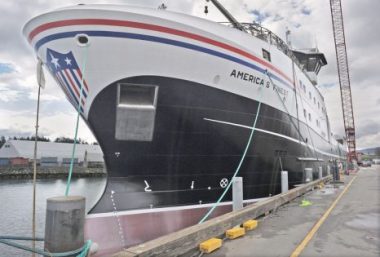
No rescue by Congress for $75M fishing boat in Anacortes that can’t fish in U.S. waters
A state-of-the-art $75 million factory trawler moored at an Anacortes dock is called “America’s Finest,” but that name could end up being a cruel irony for the shipyard and fishing company that hoped to put it to work. The still-unfinished vessel is not allowed to dip a net in U.S. waters because the hull contains too much steel modified overseas. A congressional waiver to overcome that failed to make it into the $1.3 trillion spending bill signed Friday by President Donald Trump. Mike Nelson, vice president of Dakota Creek Industries Anacortes, said the failure to gain >click to read<22:59

Senator pursuing new route to Jones Act waiver for America’s Finest
The push to get a Jones Act waiver for America’s Finest will take a new tack in the U.S. Senate. Earlier this week, the Senate Homeland Security Committee approved its own version of the Department of Homeland Security reauthorization bill. The Senate’s version did not include an amendment approved by the House of Representatives to grant a waiver for the USD 75 million (EUR 61 million) ship built by Dakota Creek at its Anacortes, Washington facility for Fishermen’s Finest. >click to read< 14:09
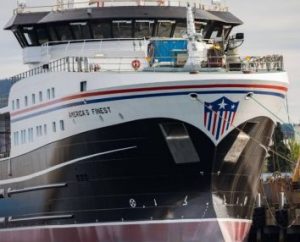
Anacortes delegation travels to Unalaska
Visitors from Anacortes, Wash., traveled to the Aleutian Islands last week to urge the Unalaska City Council to stop asking the U.S. Congress to restrict a stranded factory trawler from buying cod at sea. Earlier, Unalaska Mayor Frank Kelty sent the state’s congressional delegation a letter urging “sideboard” restrictions on any Jones Act waiver granted to the new factory trawler America’s Finest. The vessel ran afoul of federal domestic content law when it was discovered it had excess foreign steel in its hull. Now, the state-of-the-art $74 million flatfish factory trawler can’t fish in the U.S., unless Congress grants a waiver. >click to read< 12:531
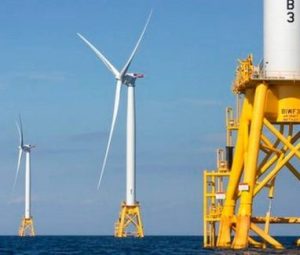
What Does the Jones Act Mean for Offshore Wind?
The Block Island Wind Farm, a 30-megawatt wind farm located just off the coast of Rhode Island, began operations in December 2016, fulfilling the goal of the project’s developer, Deepwater Wind LLC, to build America’s first offshore wind farm. The Block Island Wind Farm consists of only five wind turbines and is tiny in comparison to the large offshore wind farms operating off the coasts of Europe, but Deepwater Wind is planning larger wind farms off the coasts of New York, Massachusetts, Rhode Island, Maryland and New Jersey. Other developers are doing the same with other projects up and down the East Coast of the United States. >click to read< 14:37
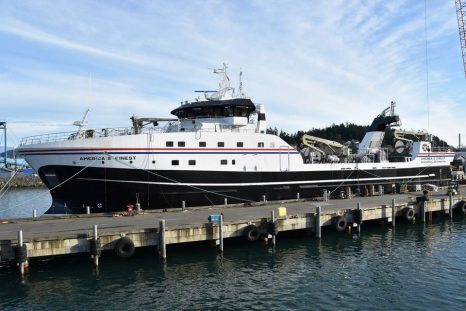
Puget Sound fishing firms tussle in Congress over new ship that ran afoul of federal law
By now, the $75 million America’s Finest should be deep into its first winter harvest season, catching and processing yellowfin sole and other fish in the Bering Sea. Instead, the 264-foot vessel — the largest trawler built in the Pacific Northwest in recent decades — is still unfinished. It sits moored at a dock at Dakota Creek Industries in Anacortes, and the shipyard has laid off more than 130 employees. Fishermen’s Finest wants the Washington and Alaska congressional delegations to back a straightforward waiver to the century-old Jones Act, which requires vessels transporting cargo and people between U.S. ports to have a hull largely made of American materials. >click to read< 13:46 

Unalaska business owner denounces city position on trawler
The mothershippers are fighting back with the help of a local proxy in a politicized commercial fishing tussle reaching all the way to Washington, D.C. The latest round of the inshore-offshore battle between Fisherman’s Finest’s cod factory trawlers, onshore seafood processors, and a local government, is taking on the familiar feel of the vintage pollock war. An Unalaska business owner is denouncing a city position calling for restrictions on the beleaguered vessel America’s Finest, a brand new vessel stranded in an Courtesan, Wash., shipyard since it ran afoul of the federal Jones Act by exceeding the legal limits of foreign steel in its hull. >click to read< 13:38
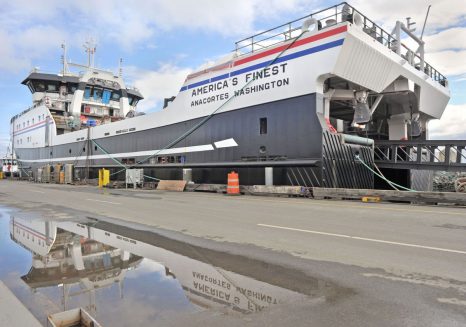
Mayors go to D.C. to lobby for Anacortes shipbuilder
The mayors of Anacortes and Mount Vernon traveled to Washington, D.C., last week to urge legislators to forgive a local shipbuilder’s mistake. In speaking to the state’s Congressional delegation, Anacortes Mayor Laurie Gere lobbied for a waiver that would allow a ship built in the city to be used in U.S. waters, thus protecting the jobs of those who work for the shipbuilder. America’s Finest, the vessel in question, was built by Dakota Creek Industries in Anacortes for the Kirkland-based company Fisherman’s Finest for use in the Bering Sea. click here to read the story 13:50
U.S. Coast Guard Issues New Jones Act Build Guidance
 U.S. maritime laws generally referred to as the “Jones Act” restrict U.S. domestic commerce to “U.S.-built” vessels. Because the rules governing what constitutes “U.S.-built” are technical and esoteric, and the consequences of not meeting the standards can be financially catastrophic for the shipyard or vessel owner or both, the U.S. Coast Guard has a regulatory process where it provides advance guidance confirming that a prospective project satisfies the applicable criteria. On October 4, 2017, the Coast Guard issued build determinations for the two Kanaloa-class combination container and roll-on/roll-off vessels to be constructed by the National Steel and Shipbuilding Company (NASSCO). These build determinations have taken on added importance because of the America’s Finest project. click here to read the story 15:04
U.S. maritime laws generally referred to as the “Jones Act” restrict U.S. domestic commerce to “U.S.-built” vessels. Because the rules governing what constitutes “U.S.-built” are technical and esoteric, and the consequences of not meeting the standards can be financially catastrophic for the shipyard or vessel owner or both, the U.S. Coast Guard has a regulatory process where it provides advance guidance confirming that a prospective project satisfies the applicable criteria. On October 4, 2017, the Coast Guard issued build determinations for the two Kanaloa-class combination container and roll-on/roll-off vessels to be constructed by the National Steel and Shipbuilding Company (NASSCO). These build determinations have taken on added importance because of the America’s Finest project. click here to read the story 15:04
US Waives Jones Act to Secure Fuel for Hurricane Responders
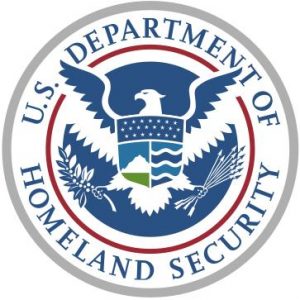 The U.S. government on Friday said it was temporarily waiving a law that limits the availability of cargoes on the U.S. coasts, a step that will ensure enough fuel reaches emergency responders during Hurricane Irma and in the wake of Hurricane Harvey. The Jones Act mandates the use of U.S.-flagged vessels to transport merchandise between U.S. coasts. The Department of Homeland Security waived the requirement for one week. This will allow oil and gas operators to use often cheaper, tax-free, or more readily available foreign-flagged vessels. click here to read the story 10:03
The U.S. government on Friday said it was temporarily waiving a law that limits the availability of cargoes on the U.S. coasts, a step that will ensure enough fuel reaches emergency responders during Hurricane Irma and in the wake of Hurricane Harvey. The Jones Act mandates the use of U.S.-flagged vessels to transport merchandise between U.S. coasts. The Department of Homeland Security waived the requirement for one week. This will allow oil and gas operators to use often cheaper, tax-free, or more readily available foreign-flagged vessels. click here to read the story 10:03

U.S.-Built Trawler is Not Jones Act-Qualified
The U.S. Coast Guard has issued another letter ruling on U.S. built vessels with foreign-made components. The latest case involves a factory trawler named America’s Finest under construction in the state of Washington. Certain “cold-formed” steel plates were already installed as part of the hull and the cold-forming process was conducted overseas. A U.S. shipyard requested coastwise and fisheries trade status for the vessel, and was just denied by the U.S. Coast Guard. click here to read the story 08:17

Dakota Creek Industries trying to make things right in eyes of Congress
Dakota Creek Industries owner Mike Nelson and his staff have been looking for ways to appease federal lawmakers following the mistake the company made in building the $75 million fishing vessel America’s Finest. The mistake — using too much foreign-formed steel in the vessel’s hull — requires a waiver from the U.S. Congress in order for the ship to fish domestically. The waiver would be for the Jones Act, which requires domestic fishing vessels be built in the U.S. These days, Nelson glances frequently at his cell phone hoping for good news concerning his company’s lobbying efforts in Washington, D.C. click here to read the story 12:12

New Anacortes-built trawler could be grounded by old law, endangering two local firms
The largest, most modern American-made trawler built in nearly three decades may be barred from fishing in U.S. waters, with financial repercussions to its local builder and buyer “so draconian that neither company may survive.” That’s the scenario painted by the law firm that Anacortes shipyard Dakota Creek Industries has hired to seek a rare waiver from a century-old law called the Jones Act, which they acknowledge wasn’t properly followed when the shipyard began building the state-of-the art, $75 million vessel Americas Finest. The shipyards mistake using too much foreign steel that was modified before coming into the U.S. could mean the advanced ship must be sold abroad at a big loss. click here to read the story 08:40






